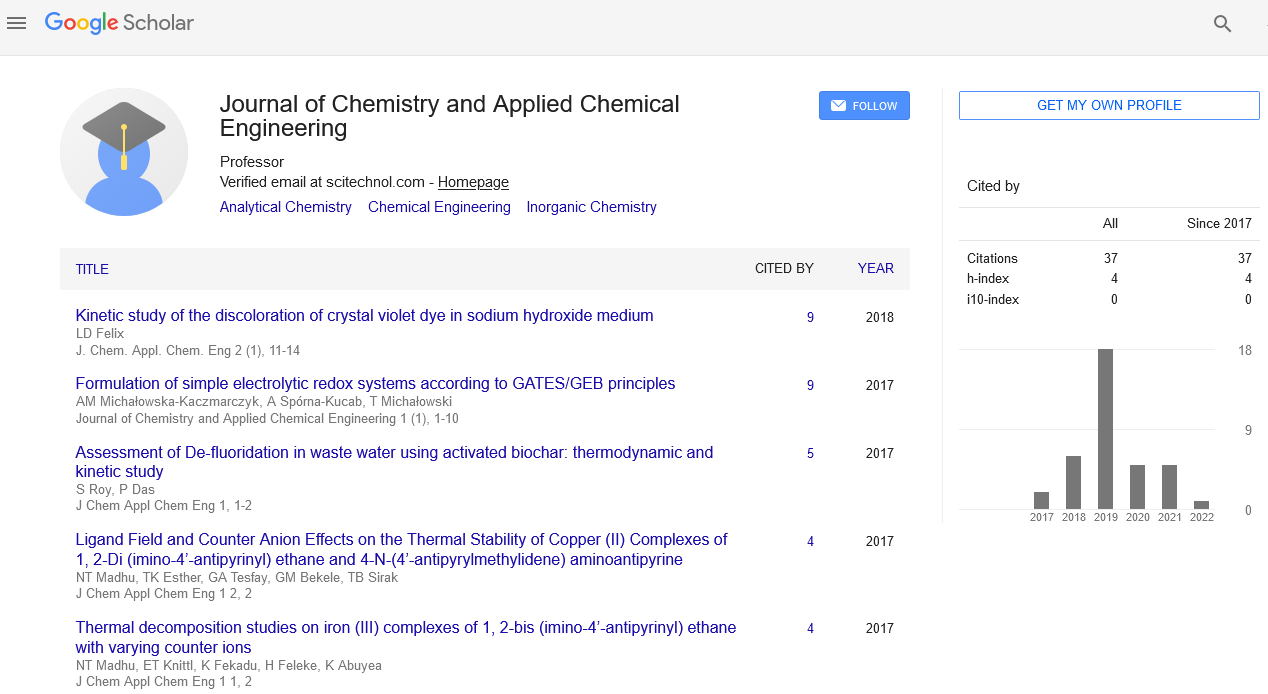Commentary, J Chem Appl Chem Eng Vol: 7 Issue: 3
Transforming Oil and Natural Gas into Raw Materials: A Sustainable Approach
Aguire Welshman*
1Department of Chemical and Biomolecular Engineering, Lamar University, Texas, USA
*Corresponding Author: Aguire Welshman,
Department of Chemical and
Biomolecular Engineering, Lamar University, Texas, USA
E-mail: aguire_welshman@gmail.com
Received date: 30 August, 2023, Manuscript No. JCACE-23-116796;
Editor assigned date: 01 September, 2023, Pre QC No. JCACE-23-116796(PQ);
Reviewed date: 15 September, 2023, QC No. JCACE-23-116796;
Revised date: 22 September, 2023, Manuscript No. JCACE-23-116796 (R);
Published date: 29 September, 2023, DOI: 10.4172/Jcace.1000036
Citation: Welshman A (2023) Transforming Oil and Natural Gas into Raw Materials: A Sustainable Approach. J Chem Appl Chem Engl 7:3.
Description
The transformation of oil and natural gas into raw materials is a process that plays a pivotal role in our modern industrialized world. These fossil fuels are not only a primary source of energy but also serve as important feedstocks for the production of a wide range of raw materials, including plastics, chemicals, and synthetic fibers. As the world's focus shifts towards sustainability and reducing our carbon footprint, it becomes essential to explore innovative ways to harness the potential of oil and natural gas while minimizing their environmental impact. The Building Block of Modern Life Crude oil, often referred to as "black gold," is a complex mixture of hydrocarbons and other compounds. It is primarily used as a source of energy in the form of gasoline, diesel, and jet fuel. However, crude oil is also a essential feedstock for the production of petrochemicals. Through various refining processes, crude oil can be transformed into an array of raw materials used in manufacturing industries, including plastics, rubber, and synthetic textiles. A Versatile Resource Natural gas, primarily composed of methane, is another valuable fossil fuel that serves as an energy source and a raw material precursor. It plays a significant role in various industries, such as chemical manufacturing. Methane can be converted into more complex hydrocarbons through processes like steam methane reforming, an important step in the production of chemicals like ammonia and methanol.
Sustainable transformations
Petrochemicals and Plastics the production of petrochemicals and plastics from oil and gas feedstocks has historically been energyintensive and resource-dependent. However, the growing concern about climate change and environmental pollution has led to significant advancements in sustainable technologies. For instance, researchers are working on developing more energy-efficient processes and exploring renewable energy sources for these transformations. Additionally, innovations like bio-plastics made from renewable resources are reducing our reliance on traditional plastic materials derived from fossil fuels. Circular Economy and Recycling Another sustainable approach to reduce the environmental impact of oil and gas-based raw materials is the adoption of a circular economy model. This model emphasizes recycling and reusing materials, thereby reducing the need for virgin feedstocks. Through effective recycling and waste management, the plastics and chemical industries can significantly decrease their reliance on oil and gas. Carbon Capture and Utilization (CCU) technologies have the potential to transform Carbon ioxide (CO2) emissions from oil and gas operations into valuable raw materials. By capturing CO2 emissions and converting them into chemicals or other products, CCU can not only reduce the environmental footprint but also turn a waste product into a valuable resource.
Reducing the energy consumption associated with these transformations is crucial to minimizing their environmental impact. Research and innovation are needed to make these processes more energy-efficient. The environmental consequences of oil and gas extraction and processing cannot be ignored. Sustainable practices must be integrated into every stage of the supply chain to minimize pollution and ecological damage. Efforts to transition from fossil fuel feedstocks to renewable and sustainable alternatives are essential. Biobased and recycled materials can be viable alternatives, provided they meet quality and performance standards.
Conclusion
The transformation of oil and natural gas into raw materials is a critical process underpinning modern industrial production. As we navigate the challenges of sustainability and climate change, it is essential to find innovative ways to make these transformations more environmentally friendly and efficient. By embracing sustainable technologies, circular economy principles, and the potential of carbon capture and utilization, we can mitigate the environmental impact and reduce our dependence on fossil fuels as raw material precursors. This transition will play a pivotal role in building a more sustainable and eco-conscious future for the global manufacturing industry.
 Spanish
Spanish  Chinese
Chinese  Russian
Russian  German
German  French
French  Japanese
Japanese  Portuguese
Portuguese  Hindi
Hindi 